 “Feminism 101: Instead of being the doormat get up and be the door,” says Lillian Allen, looking up at row upon row of cheering women during the International Women’s Day (IWD) Rally.
“Feminism 101: Instead of being the doormat get up and be the door,” says Lillian Allen, looking up at row upon row of cheering women during the International Women’s Day (IWD) Rally.Her poetry articulates our struggles. “Laugh when they try to bend your back down low.”
We’re in the OISE building at 252 Bloor St. and its starting to rain outside. It’s about 11:30 a.m. on March 7th and inside there are mothers, students, grandmothers, immigrant workers, activists, children, husbands, boyfriends, friends, sons, and daughters. They may not be here for the same reasons by there is a common thread running throughout this auditorium. They are here to support the women that they know, the women that they are, and those they might never meet.
As one speaker bluntly puts it, “We all came off different ships, but we’re in the same boat now.”
The Toronto theme of IWD is “Good Jobs, Dignity for All.”
A good job is something that many women are forced to do without. Minimum wage is $8.00 in Canada. Think about a mother working full time shifts that receives a mere eight dollars f
 or her labour. Think about raising children on that kind of salary. Think about being in debt, paying off loans, and making that kind of money. That’s the reality for many and that’s why IWD is fighting to raise minimum wage to $10.00.
or her labour. Think about raising children on that kind of salary. Think about being in debt, paying off loans, and making that kind of money. That’s the reality for many and that’s why IWD is fighting to raise minimum wage to $10.00.“We will not be quiet and we will not be ignored,” says Judy Vashti Persad, an organizer of the event and our first speaker of the morning. “We must continue to be a movement for all women.”
Now it is time for our morning history lesson. Introduce Rosie the riveter. You know that feminist icon that you see on poster, t-shirts, etc? That woman in the red bandana, flexing her bicep in her blue factory uniform, well she was a real person.
 Long before she became an icon of the American feminist movement she was the propaganda poster girl for WWII, urging women to get out into the workforce. This morning two women in bandanas converse on stage in an insightful dialogue about the woman behind the poster, the “Real Rosie.” Rose Will Monroe worked in an aircraft factory in Michigan in 1920 and was featured in a promotional home war effort film, as well as a poster campaign. She even had a theme song, “Rosie the Riveter,” which was performed acoustically by Ryerson Free Press editor Nora Loreto.
Long before she became an icon of the American feminist movement she was the propaganda poster girl for WWII, urging women to get out into the workforce. This morning two women in bandanas converse on stage in an insightful dialogue about the woman behind the poster, the “Real Rosie.” Rose Will Monroe worked in an aircraft factory in Michigan in 1920 and was featured in a promotional home war effort film, as well as a poster campaign. She even had a theme song, “Rosie the Riveter,” which was performed acoustically by Ryerson Free Press editor Nora Loreto.“But if war made men out of boys it made feminists out of women,” says a “Rosie” on the stage. As women entered the workforce at the time, some factories started offering services such as daycare. “I wonder what it would take for them to do that today?” enquires one Rosie, igniting audience laughter. This led women’s movements towards unionization for better conditions in the workplace. Today, “Rosie became what all women made her, a symbol of women’s power in the workplace.”
But there is a lack of power over our education. Liana Salvador, the Vice President of Education at Ryerson University’s Student Union, takes the stage to articulate her realizations about facing academic obstacles. “High tuition fees disproportionately affect women,” she says. She recounts her experience as a woman of color, working in low paying jobs, in debt, to finance her education. “My government is giving me a really shoddy deal.”
Currently earning her second University degree, Liana is over $50,000 in debt. “Hey Dalton, I didn’t make as much this summer, can I pay half? That’s not going to happen,” she says.
Instead of channeling money into the military, the Canadian government should be funding our education system, because debt is crippling female students. “We need to stop being underpaid, undervalued and under funded,” says Salvador.
Next to take the stage is a woman who discusses the value of IWD, and asks women to consider contributing an hour’s worth of their pay, or any amount within their ability, towards funding this event. She explains the meaning behind each Canadian bill. For example, the fifty dollar bill features the Famous Five-Emily Murphy, Nellie McClung, Irene Parlby, Henrietta Muir Edwards, and Louise McKinney- who fought for the “Persons” Case, giving women civil rights and the status of person under British Privy Council.
 She says that because the government hardly wants women thinking of feminism every time they purchase a coffee, they imprint a monumental achievement in women’s right on a bill that some of us rarely see.
She says that because the government hardly wants women thinking of feminism every time they purchase a coffee, they imprint a monumental achievement in women’s right on a bill that some of us rarely see.The twenty dollar bill, featuring Elizabeth II, Queen of England, is one woman that will never have to worry about her pension or replacing a hip, says our speaker, to swells of laughter from the audience. “I hope there are a few bills floating around now,” she says, with a wide smile, as jingling buckets pass from hand to hand.
Two women who work at the Toronto Rape Crisis Centre stand beside each other, telling stories of sexual abuse that span miles. The auditorium is silent, as their voices confront the pain, the numbness and the healing. They speak of abuse at the hands of family and strangers, the depression, the sense of betrayal towards those that should have loved them.
One woman is older, with a long braid of grey and white locks hanging down her back. The other is young, in a t-shirt and jeans with a mass of small curls framing her face. She says, “My heart aches that even my brother didn’t spare me.” The older woman answers, “Neither did mine.”
“I called and called the shelters. ‘Sorry, no bed again. Call again.’”
“I swore I would never let my heart feel again.”
“All I longed for was to be loved.”
“It happened again, it must be my fault.”
“Afraid to trust.”
“Afraid to leave my daughter with anyone.”
“I am proud of the feminist I have become.”
The other answers, “It was never my fault.”
Our last performer before we head out to march, with signs and banners in hand, is Michelle St. Bernard, a.k.a. Belladonna. Her lyrics hinge together, smashing into one another, like cars on a freight train. The links are powerful and the impact is heavy, forcing you to see the tracks her mind has followed. “I’m so low in the barrel that you don’t believe it.”
“I’m so low on the totem pole I’m about to grow roots.”
The tracks end with, “I’m so strong, cuz you’re so strong, and we’re so strong.”
“We got to get up.”
It may be raining, but we get up.
“It happened again, it must be my fault.”
“Afraid to trust.”
“Afraid to leave my daughter with anyone.”
“I am proud of the feminist I have become.”
The other answers, “It was never my fault.”
Our last performer before we head out to march, with signs and banners in hand, is Michelle St. Bernard, a.k.a. Belladonna. Her lyrics hinge together, smashing into one another, like cars on a freight train. The links are powerful and the impact is heavy, forcing you to see the tracks her mind has followed. “I’m so low in the barrel that you don’t believe it.”
“I’m so low on the totem pole I’m about to grow roots.”
The tracks end with, “I’m so strong, cuz you’re so strong, and we’re so strong.”
“We got to get up.”
It may be raining, but we get up.
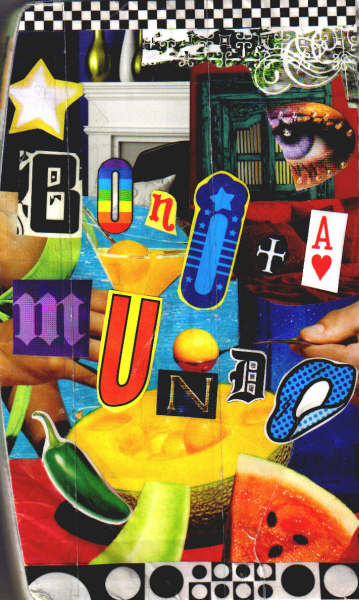







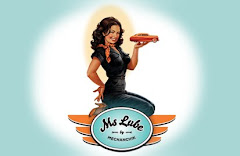








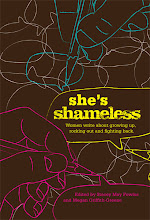
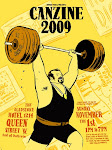





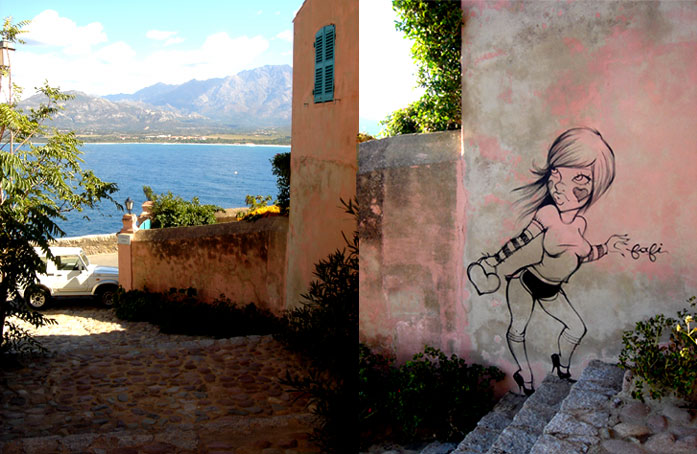
1 comment:
I appreciate your passion on the topic but I have taken issue with many of your well-elaborated points.
1. While I find it unfortunate that there are mothers out there working for minimum wage, I believe that focusing your attention to raising the wage is completely ignoring the plight of the single mother (or father) working for nearly nothing. Why is he/she out there? Why don't they have an education? Why do they have children without the means to support them? A person works for minimum wage through their own decisions and actions, not through some sort of conspiracy against poor parents.
A parent in debt became that way through something they did - it might be cruel but it is correct. If you can't pay for your education, don't go into debt in the first place. If you can't make a car payment, don't get the car.
2. I find this statement: “High tuition fees disproportionately affect women,” without any sort of explanation, especially considering the fact that Post-secondary education in this country is effectively 60/40 female/male. A woman doesnt get less OSAP based on her sex, so I can't see a correlation in the slightest here.
Keep in mind that women don't have a monopoly on low-paying jobs, I know this all too well.
3. Yet again, blaming the Government for your own debtload is a very cheap and convenient way out of responsibility. The Ryerson Vice-President of Education, Ms. Salvador, is 50 000$ in debt because she decided to get an education worth $50 000. The Honourable Premier has no obligation to start paying her for services she received from higher education.
4. Saying that higher education is underfunded in Canada is a remarkable oversight, Canadian Universities absolutely RELY on Government dollars, otherwise our tuition would very quickly resemble an American figure. The scholarships and OSAP are a very generous program that the government has NO obligation to support, but does so anyways - incurring a huge debt to keep people going to school.
5. I certainly hope the 50-dollar anecdote to be silly humour, otherwise I would be concerned for those who believe such hilarious madness.
In conclusion to this overly long comment, I urge you to understand that all Canadian citizens deserve a modicum of respect and I can only hope they understand the central idea of responsibilty - if you're working in a hole for $8/hr, hopefully you're there because of your own decisions.
Post a Comment